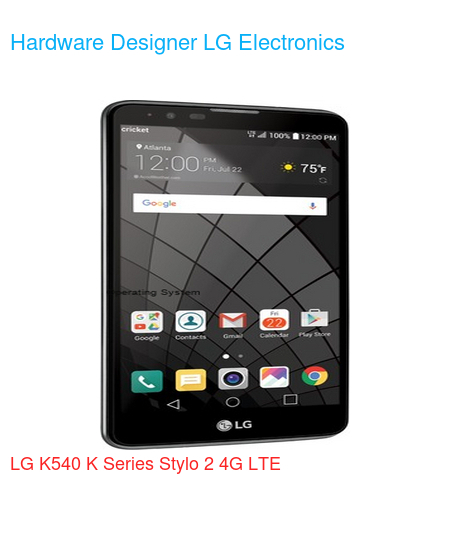| Brand | LG |
| Model | K540 K Series Stylo 2 4G LTE |
| Released | 2016 Apr 21 |
| Hardware Designer | LG Electronics |
| Manufacturer | LG Electronics |
| General Extras | Haptic touch feedback , Active stylus |
| Device Category | Smartphone |
| Width | 79.6 mm |
| Height | 155 mm |
| Depth | 7.4 mm |
| Dimensions | 3.13×6.10×0.29 inches |
| Mass | 145 g |
| Platform | Android |
| Operating System | Google Android 6.0.1 (Marshmallow) |
| CPU Clock | 1200 MHz |
| CPU | Qualcomm Snapdragon 410 MSM8916, 2014, 64 bit, quad-core, 28 nm, Qualcomm Adreno 306 GPU |
| RAM Type | LPDDR3 SDRAM |
| RAM Capacity (converted) | 2 GiB RAM |
| Non-volatile Memory Interface | eMMC 4.5 |
| Non-volatile Memory Capacity (converted) | 16 GB ROM |
| Display Diagonal | 145 mm |
| Resolution | 720×1280 |
| Horizontal Full Bezel Width | 8.51 mm |
| Display Area Utilization | 72.8% |
| Pixel Density | 257 PPI |
| Display Type | Color IPS TFT LCD display |
| Number of Display Scales | 16.8M |
| Scratch Resistant Screen | Gorilla Glass 3 |
| Graphical Controller | Qualcomm Adreno 306 |
| Dedicated Graphics Memory | 0.125 MiB |
| A/V Out | No |
| Microphone(s) | stereo |
| Loudspeaker(s): | mono |
| Audio Output: | 3.5mm |
| Supported Cellular Bands | GSM850 , GSM900 , GSM1800 , GSM1900 , UMTS2100 (B1) , UMTS1900 (B2) , UMTS850 (B5) , LTE1900 (B2) , LTE1700/2100 (B4) , LTE850 (B5) , LTE700 (B12) bands |
| Supported Cellular Data Links | GPRS , EDGE , UMTS , HSUPA , HSDPA , HSPA+ 21.1 , LTE , LTE 150/50 data links |
| SIM Card Slot | Yes |
| Complementary Phone Services | Voice transmission , Voice speaker , Vibrate , Speakerphone , ANC |
| Sec. Supported Cellular Networks: | No |
| Touchscreen Type | Capacitive multi-touch screen |
| Expansion Interfaces | TransFlash , microSD , microSDHC |
| USB | Yes |
| USB Services | USB charging |
| USB Connector | USB Micro-B (Micro-USB) |
| Bluetooth | Bluetooth 4.1 |
| Wireless LAN | 802.11b , 802.11g , 802.11n |
| Wireless Services | Wi-Fi Direct |
| FM Radio Receiver | Unknown |
| Complementary Satellite Services | A-GPS , Geotagging , QuickGPS |
| Supported GLONASS protocol(s) | L1OF |
| Camera Placement | Rear |
| Camera Image Sensor | CMOS |
| Number of effective pixels | 13.0 MP camera |
| Zoom | 1.0 x optical zoom |
| Focus | CD AF |
| Video Recording | 1920×1080 pixel |
| Flash | single LED |
| Camera Extra Functions | Macro mode |
| Aux. Camera Image Sensor | No |
| Aux. 2 Camera Image Sensor | No |
| Aux. 3 Camera Image Sensor | No |
| Aux. 4 Camera Image Sensor | No |
| Secondary Camera Placement | Front |
| Secondary Camera Sensor | CMOS |
| Secondary Camera Number of pixels | 4.9 MP sec. cam |
| Secondary Video Recording | 1920×1080 pixel |
| Sec. Aux. Cam. Image Sensor | No |
| Built-in compass | Yes |
| Built-in accelerometer | Yes |
| Built-in gyroscope | Yes |
| Additional sensors | FP sensor , L sensor , P sensor |
| Protection from solid materials | Yes |
| Protection from liquids | Yes |
| Battery | Li-ion |
| Nominal Battery Capacity | 3000 mAh battery |
| Market Countries | USA |
| Mobile Operator | Cricket Communications |
| Added | 2024-06-25 |
Specifications data description of this 📱LG K540 K Series Stylo 2 4G LTE📱
Title: Specification of the Device: A Comprehensive Overview
Introduction
————
In today’s fast-paced world, technology never ceases to amaze us. With the constant evolution of devices, staying updated with the latest specifications and features has become crucial. In this blog post, we will provide an in-depth analysis of a device’s specifications, including 🌐NETWORK,LAUNCH📅,BODY🏋️,🌈 DISPLAY,🤖 OS 🛠️,🚀 Chipset 🔧,💪 CPU 🖥️,🎮 GPU 💻,🧠 MEMORY 🗂️,📷 CAMERA 🎥,🔈 SOUND 🎵,📡 COMMS 📶,💡 FEATURES 🎁,🔋 BATTERY🔌. So, let’s dive in and explore the fascinating world of device specifications.
Lineup
——
In the ever-evolving landscape of devices, it is crucial to know the lineup, which can help you understand where the device stands in the market. This information includes details about the launch date, model number, and other relevant information that enables users to determine the device’s lifecycle. Additionally, it gives an idea about the device’s support period and when users can expect updates.
Design
—–
The design of a device plays a significant role in how it is perceived and its overall user experience. We will cover aspects such as the device’s dimensions, weight, and aesthetics, helping you visualize and understand its form factor before making a purchase decision.
* Size: Understanding the size helps users determine whether the device fits their hands, bags, or pockets.
* Weight: The weight should be suitable for prolonged use.
* Build quality & material: Devices come in various materials, such as plastic, metal, or glass. The build quality ensures that the device is durable, sturdy, and long-lasting.
Specifications
————–
### 🌐NETWORK,LAUNCH📅,BODY🏋️
* Network: The network capabilities include details about the supported networks (2G, 3G, 4G, 5G), Bluetooth, GPS, and NFC.
* Launch: The date the device was launched in the market provides an idea of the device’s age and how long it has been available.
* Body: The body of the device covers aspects like Sim card slots, water and dust resistance, and other certifications.
### 🌈 DISPLAY
* Display: Users look for screens with excellent quality, brightness, color accuracy, and viewing angles.
* Size: Display size has become an essential factor for users.
* Resolution: The resolution of the display determines the clarity and sharpness of the visuals.
### 🤖 OS 🛠️,🚀 Chipset 🔧
* OS: An overview of the Operating System provides users with an understanding of the user interface and ecosystem.
* Chipset: The chipset determines the device’s performance, and it’s essential to evaluate this aspect when comparing devices.
### 💪 CPU 🖥️,🎮 GPU 💻
* CPU: The Central Processing Unit is responsible for handling tasks, and an efficient CPU ensures smooth performance.
* GPU: The Graphics Processing Unit manages the visual aspects of the device, and a powerful GPU can significantly improve the user experience while using visually demanding applications.
### 🧠 MEMORY 🗂️
* Memory: Memory management is crucial in devices. Enough memory ensures smooth performance and minimal lag.
### 📷 CAMERA 🎥
* Camera: Today, the camera is a crucial factor when comparing devices, with users looking for high-resolution, low-light capabilities, and additional features like Optical Image Stabilisation (OIS) and AI enhancements.
### 🔈 SOUND 🎵
* Sound: Devices are increasingly focusing on audio quality, with support for spatial audio, high-resolution sound, and Dolby Atmos.
### 📡 COMMS 📶
* Comms: Communication capabilities include Wi-Fi, USB ports, and other data transfer options.
Conclusion
———-
With the increasing variety of devices and features, understanding a device’s specifications becomes paramount in making informed decisions. Aspects like 🌐NETWORK,LAUNCH📅,BODY🏋️,🌈 DISPLAY,🤖 OS 🛠️,🚀 Chipset 🔧,💪 CPU 🖥️,🎮 GPU 💻,🧠 MEMORY 🗂️,📷 CAMERA 🎥,🔈 SOUND 🎵,📡 COMMS 📶,💡 FEATURES 🎁,🔋 BATTERY🔌 significantly impact the user experience, and it’s critical to evaluate these specifications while making a choice. We invite you, dear readers, to leave a comment below, share your thoughts, and help make the device selection process easier for the community.














